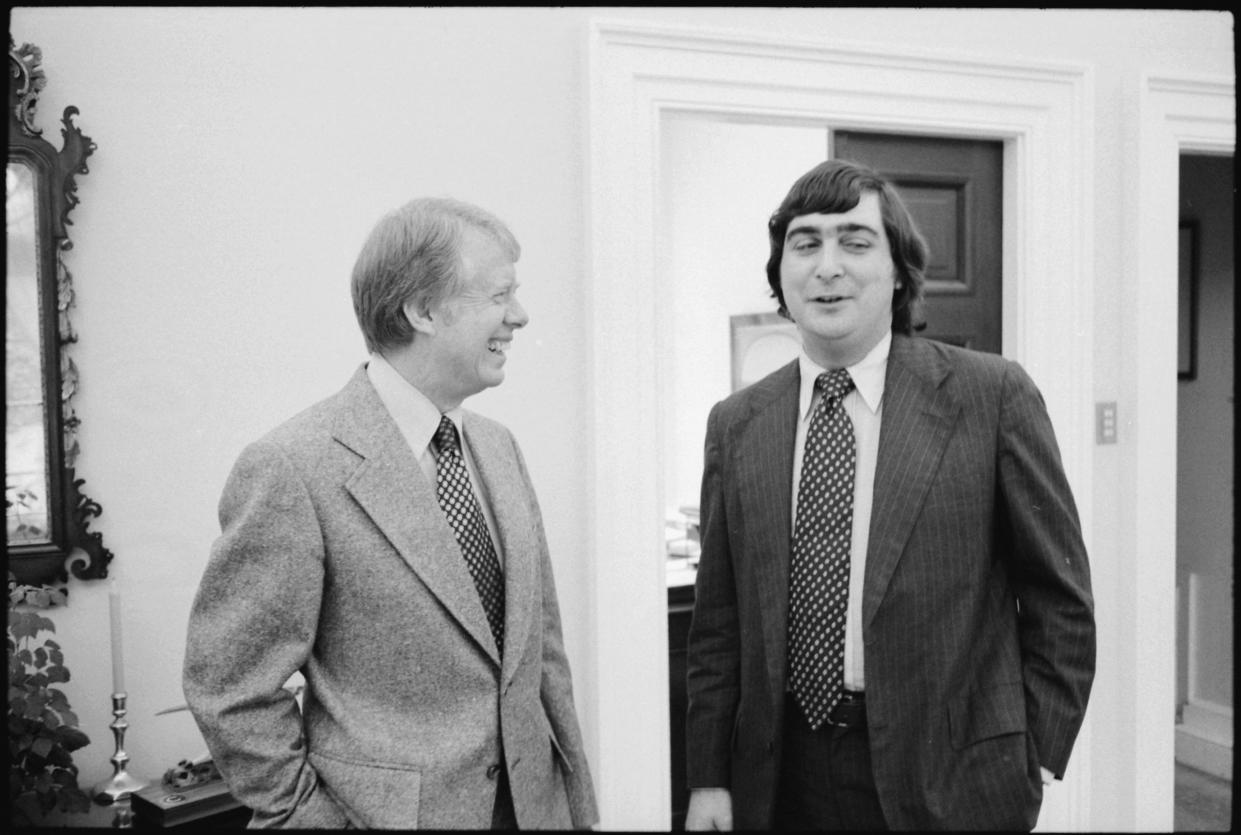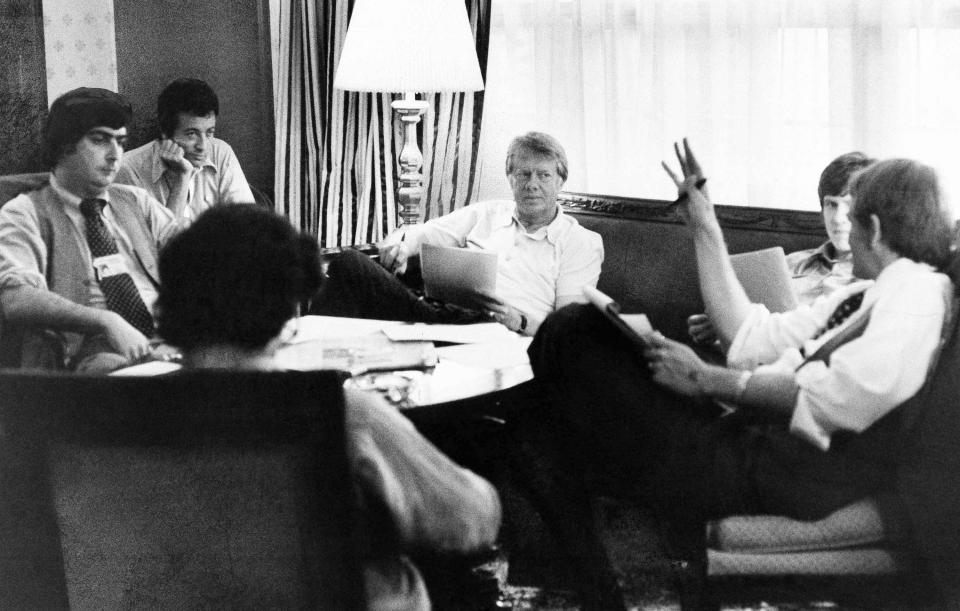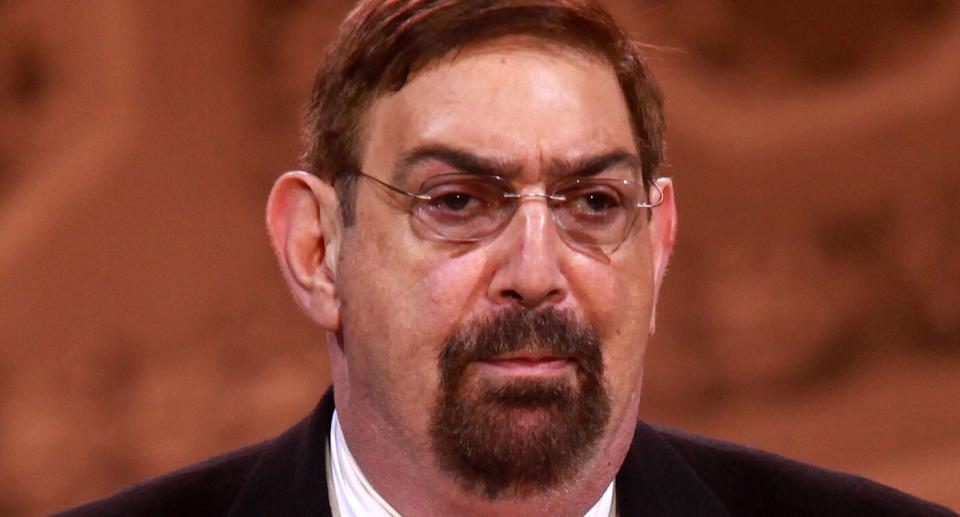Patrick Caddell, pollster who helped Carter channel voter disaffection, dies at 68

Patrick Hayward Caddell, a political pollster who advised several Democratic presidential candidates but became a pundit on conservative media late in his career, and who was a singular voice in favor of channeling the antiestablishment sentiments of voters, died Saturday at age 68 from complications of a stroke, according to his daughter, Heidi Eichelberger.
Caddell was a savant, a visionary to some and a mad scientist to others, whose force of personality and brilliance kept him in the middle of presidential politics from 1972 to 1992, and a constant presence even after that. He had close personal relationships with former President Jimmy Carter and his wife, Rosalynn, and with former Vice President Joe Biden, until a public falling out after Biden’s 1988 presidential run.
Caddell got his political start fresh out of college, as a 21-year-old pollster on the 1972 presidential campaign of Sen. George McGovern, D-S.D. And during the ’70s, he reinvented and elevated the role of the pollster. Caddell had no professional training in the field and made it about much more than just numbers. He drew on large pools of data and wrote long memos that mixed analysis and prediction with fierce self-assurance.
His specialty was divining the mood of the country. And over time, the chief themes that emerged from his study were the alienation and disillusionment of American voters, and their anger at a rigged political system that they believed disproportionately benefits the elites. For four decades, those themes have been relevant and powerful.
Caddell was a key adviser to Carter’s presidential campaign in 1976 and became a core member of his brain trust throughout his presidency. He had a major role in encouraging Carter to take extreme measures in response to the energy crisis of 1979, a turn of events that gave rise to what has become known as Carter’s “malaise” speech.
Caddell remained a political player long afterward, becoming more conservative through the decades. He was an informal adviser to President Trump during the 2016 presidential campaign, and the two spoke occasionally after Trump won the presidency.

Caddell was born in Rock Hill, S.C., and attended high school in Jacksonville, Fla., where he built a voter model for a local election. He ended up working two years later for the speaker of the Florida House, according to a 1987 Washington Post profile.
Caddell went to Harvard, where he wrote about the future of the South in the aftermath of the 1968 election in which segregationist former Alabama Gov. George Wallace won five states. He met Carter when McGovern visited Georgia during Carter’s turn as governor and they talked about his thesis.
“Wallace had two components in the ’68 vote: the racist part and the populist part. The key was who was going to get the populist part,” Caddell said over lunch in April 2017 at a seafood restaurant in Charleston, S.C., where he had moved a decade ago to be closer to his daughter and grandchildren.
Florida had not voted for Wallace in 1968, and Caddell helped Carter plan for the 1976 Florida primary. Young Florida Democratic operatives persuaded most of the 16 other candidates running in 1976 not to run in the Florida primary in order to give Carter a clean shot at defeating Wallace head-to-head, which he did by a margin of 34 to 30 percent.
Caddell went on to help Carter fashion a message for the national campaign. “In order to win, he had to articulate a sense of what had happened to the country through Vietnam and Watergate. If you go back and look at those speeches that he gave early in the campaign, he would talk about the damage to the country, its psychology,” Caddell told the University of Virginia’s Miller Center in 1982. “Essentially, what he was running on in the campaign was that the country had been psychologically devastated by the previous decade of events. He was offering himself as a healer of that.”
Carter’s victory in the 1976 election elevated Caddell and made him a nationally known figure. He became a man about town in Washington, D.C., dating Christie Hefner, the daughter of Playboy founder Hugh Hefner, and driving a gold Mercedes.
In 1979, as rising inflation and gas lines drove Carter’s approval rating steadily downward, Caddell rang the alarm bell for the president. He warned Carter that he was losing touch with the nation, and prevailed upon him to give an extraordinary speech in early July in response to growing unrest over a national gasoline shortage. Carter spent 10 days at Camp David doing listening sessions with political, civic, religious and business leaders and returned to give the speech that is remembered by a word he never used: “malaise.”
Carter told the nation it was suffering from a “crisis of confidence” and sought to rally it in response. The speech was well-received at first, but a few days later Carter fired most of his Cabinet, and his political fortunes fell. The Cabinet firings were “not Pat’s idea,” said White House press secretary Jody Powell in 1987. And a memo detailed in my book “Camelot’s End” shows that White House chief of staff Hamilton Jordan had come up with the idea to fire the Cabinet.

Caddell never had a formal position in the Carter White House, but remained an outside adviser with a direct line to Carter and to first lady Rosalynn Carter. He told the Miller Center that he was the administration’s “greatest internal critic.”
In 1984, Caddell worked for Sen. Gary Hart’s presidential campaign. And in 1985 he formed a consulting and polling business with Robert Shrum and David Doak, which was “the hottest media firm in the party at the time,” said consultant Joe Trippi, who was vice president of the firm. But as the 1988 election approached, the firm broke up, and some blamed Caddell’s fiery temper.
Caddell advised Biden in his 1988 quest for the White House. Biden and Caddell had been friends for 15 years, and Biden told journalist Jules Witcover that at the height of his influence, Caddell was “godlike.”
Biden told Witcover that his and Caddell’s connection was such that it was “hard to know where Pat’s thinking stops and mine begins.”
But the 1988 campaign ended badly for Biden amid plagiarism charges, and Caddell also was increasingly marginalized by others on the campaign who found him hard to work with. Caddell had “some attributes of a man who landed in large matters at a very early age,” the New Yorker’s Elizabeth Drew wrote in 1979.
In 1992 Caddell worked for California Gov. Jerry Brown in the Democratic presidential primary but also offered his services to independent businessman Ross Perot. Perot, Caddell said at the time, had “given enormous power to the people.”
Years later that theme would come up again, when Caddell called Trippi one afternoon in 2003. Trippi was the top adviser to Vermont Gov. Howard Dean, who was running in the presidential primary. He and Trippi were preparing for the May 3 debate in Columbia, S.C.
“Howard wanted to say that the biggest lie on stages like this is, ‘Elect me and I’ll solve all your problems.’ We were struggling with, what’s the truth we want to say?’” Trippi said in an interview. “And right then Caddell called me. All of a sudden Pat says, ‘What about this? The truth is, the power to change this country rests in your hands, not mine.’”
“I said, ‘Yeah, you have the power,’” Trippi said. “Howard’s sitting there going, ‘That’s right, you have the power.’ It was just like sparks flying between the three of us. But Pat was definitely the first one who articulated it.
“That was Howard’s closing statement. He won that debate and it was because of the closing,” Trippi said.
Over the last decade, however, Caddell became better known for his appearances on Fox News and his writings for Breitbart News. He moved to Charleston to a house down the block from his daughter and her three children, delighting in hosting his grandson to watch Yankee games together. Around 2012, he began showing polling to Steve Bannon, who then ran Breitbart, on the themes of alienation and frustration with the American government and the two-party system. Caddell was introduced to Robert Mercer, an ultraconservative billionaire who for years was the chief funder behind Breitbart.

Caddell’s polling memos made their way to Roger Stone, who showed them to Donald Trump. And so Caddell’s arguments and insights shaped Trump’s view of the national political environment, and the two began to talk.
Trump’s win in 2016, Caddell said in an interview in Chicago in March 2017, was “about disdain.”
“Americans have decided to seize back their sovereignty,” Caddell said. “They are not going to be manipulated by their betters.”
_____
Read more from Yahoo News:
Ann Coulter: ‘Lunatic’ Trump could be challenged in 2020 — from the right
As Trump administration negotiates with Taliban, some retired U.S. generals see defeat
Crackdown on opioids has its own victims: People who need them to live
As 5G war with China heats up, could a Cold War-inspired plan be the solution?



